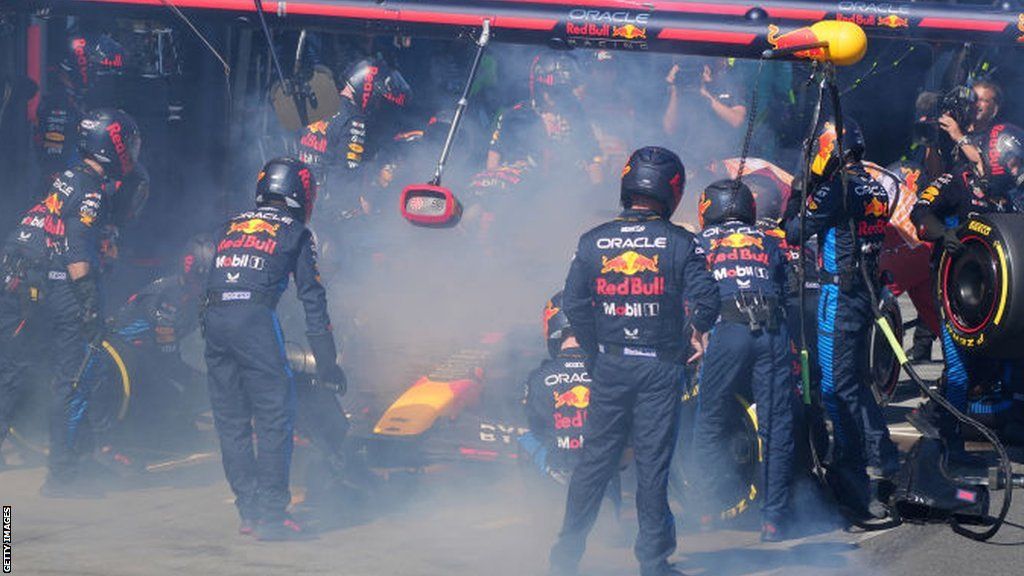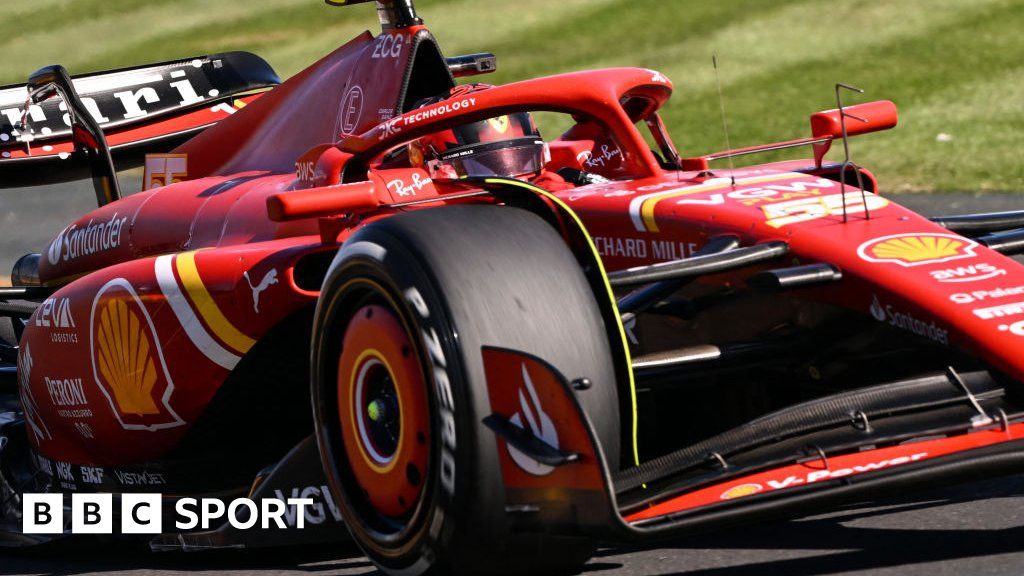
Carlos Sainz led Charles Leclerc to a Ferrari one-two in the Australian Grand Prix as Max Verstappen’s domination of Formula 1 stalled.
Sainz swept by the world champion’s Red Bull into the lead on the second lap before the Dutchman retired with a brake failure after just four laps.
The Spaniard then controlled the race as Leclerc passed McLaren’s Lando Norris in the first pit-stop period.
The race ended under a virtual safety car after a crash for George Russell.
Chasing Fernando Alonso’s Aston Martin for sixth place, the Mercedes driver lost control at Turn Six on the final lap and suffered a crash, the car coming to rest on its side, held up in the air by landing on its left-front wheel. Russell was unhurt.
It was a difficult end to a sobering day for Mercedes, on which their status as also-rans was apparently confirmed – Lewis Hamilton retired after 16 laps with an engine failure.
Norris led Oscar Piastri to a McLaren three-four ahead of Red Bull’s Sergio Perez, anonymous on a day on which he was unable to capitalise on Verstappen’s retirement.
Sainz in total control
In front of a record Melbourne crowd of 132,106 – and a weekend high of 452,055 – Sainz was in imperious form, just 16 days after having surgery to remove his appendix that forced him to miss the Saudi Arabian Grand Prix.
The 29-year-old – who has been describing the “weird” feeling of “everything in the inside just feels like it’s moving more than normal” after his operation – tracked Verstappen around the opening lap. And after Verstappen made a mistake at Turn Three on the second lap, Sainz was able to pass the Red Bull down the curving ‘straight’ to Turns Nine and 10.
Verstappen immediately came on the radio to say he had “lost the rear – weird”, and before long it was apparent why.
A lap later, he swore over the radio and said: “The car is loose.” And a lap after that smoke started to pour from his right rear wheel.
Verstappen slowed down and as he entered the pit lane, with his brakes now on fire, a clump of material flew out of his wheel on to the grass.
Underlining the strength of Red Bull in the last two years, it was his first retirement since this race two years ago.
It left Sainz in control of the race and he never showed any indication he would let it out of his grasp.
Sainz was the only non-Red Bull driver to win a race last year, when he triumphed in Singapore in a race that ended with him holding off a train of cars featuring Norris, Lewis Hamilton and Russell.
Now he has become the man to end Verstappen’s chances of equalling his own record of winning 10 races in a row – and just three races into a season he started knowing he would lose his seat at Ferrari at the end of it to Hamilton.
Sainz had Leclerc’s measure from the start of qualifying and was never under threat in the race.
He took advantage of Leclerc being stuck behind Norris in the first stint to build an advantage.
Ferrari brought Leclerc in for a relatively early stop on lap nine to undercut him past Norris, a strategy that succeeded when the McLaren stopped five laps later and emerged behind the Ferrari.
Sainz stopped on lap 16 and emerged just a second ahead of his team-mate, slowly building an advantage that extended to nearly nine seconds before Leclerc made his second stop.
A good day for McLaren, not for Perez
Norris was unable to do anything about the Ferraris, but it was nonetheless a strong weekend for McLaren.
The same could not be said for Perez, who complained about Red Bull’s decision to run him long on the first stint.
Perez was able to pass Russell and Alonso but could do nothing about the McLarens ahead on a day that will do little to boost his hopes of holding on to his Red Bull seat for 2025.
Russell’s crash meant Mercedes leave Australia pointless and promoted Aston Martin’s Lance Stroll to seventh, ahead of RB’s Yuki Tsunoda and the Haas drivers Nico Hulkenberg and Kevin Magnussen.
Alex Albon, given team-mate Logan Sargent’s Williams for the weekend after a heavy crash on Friday, was 11th, the Haas drivers just too strong in his quest for a point.
